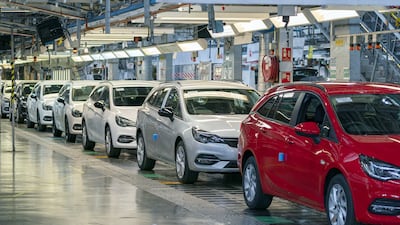The world's fourth-largest car manufacturer has said it may not be able to fulfil a pledge to build electric vehicles in Britain without changes to the Brexit deal.
Stellantis, the parent company of Vauxhall, Citroen, Peugeot and Fiat, told a parliamentary committee that the rules may not make the production and export of EVs from Britain financially viable.
The company committed to making EVs at its Ellesmere Port and Luton plants two years ago.
But Stellantis told MPs that the Brexit deal was now a “threat to our export business and the sustainability of our UK manufacturing operations”.
Under the existing deal, rules are due to change next year which will ensure that 45 per cent of an EV's value should originate in the UK or EU to qualify for trade without tariffs. Stellantis wants the imposition of that rule postponed until 2027.
The company said the rule change will add 10 per cent in tariffs on trade with the EU and would also render domestic production and exports uncompetitive, compared to imports from Japan and South Korea.

'Major competitive disadvantage'
Stellantis, which employs 5,000 workers in the UK, warned that most car manufacturers would not continue to invest and would look to move their production facilities out of Britain.
“To reinforce the sustainability of our manufacturing plants in the UK, the UK must consider its trading arrangements with Europe,” the company told MPs.
“It we are unable to rely on sufficient UK or European batteries, we will be at a major competitive disadvantage. In particular against Asian imports.
“We need to reinforce the competitiveness of the UK by establishing battery production in the UK.”
Electric cars and the manufacturing of batteries was one of several areas of difficult negotiation in the Brexit process.
It was among the last to be settled before former UK Prime Minister Boris Johnson signed the deal with President of the European Commission, Ursula von der Leyen, back in 2020.


